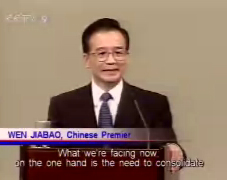 The long expected Closer Economic Partnership Arrangement, or CEPA was signed right before the sixth anniversary of Hong Kong’s return to China. It carries more meanings than just normal economic cooperation between the Special Administrative Region of China and the mainland. The long expected Closer Economic Partnership Arrangement, or CEPA was signed right before the sixth anniversary of Hong Kong’s return to China. It carries more meanings than just normal economic cooperation between the Special Administrative Region of China and the mainland.
When the battle against SARS across China was announced to carry hard-won fruits, it’s time for the country to fuel up its economic growth. As one of the worst hit region during the SARS disaster, the Hong Kong Special Administrative Region has long been absence of the once robust upward trend, which was eroded by the financial crisis raging through south-east Asia in 1998 and the not so optimistic external environment thereafter. In this summer, the central government prepared an anniversary gift for Hong Kong, which is called CEPA.
On the occasion of the mass celebration of China’s takeover of Hong Kong early this week, the Chinese central government signed the landmark deal with its Hong Kong SAR. It is designed as far more than an anniversary gift. It is generally described as a propelling machine aimed at rejuvenating Hong Kong’s sluggish economy. From another perspective, a vigorous Hong Kong will help build a more open image for China’s mainland through its deeper connection with the world. What follow the signing of the agreement will be the implementation and the negotiations on relevant details. But one thing is for sure now. That is to keep CEPA working smoothly toward a win-win direction.
On June 29, Chinese Premier Wen Jiabao started his first visit to Hong Kong Special Administrative Region since he was elected the Premier in March this year. His arrival drew warm welcome by both the Hong Kong administration and the mass of people. Just minutes after stepping down the plane ramp, Wen Jiabao couldn’t help extending his greetings to Hong Kong people.
“It’s the first time that I’ve been in Hong Kong, our own territory. I feel very glad to see Hong Kong’s compatriots. It is hoped that the journalists at presence today will convey my regard to the people of Hong Kong. Thank you,” said Chinese Premier Wen Jiabao.
As Chinese new Premier, Wen Jiabao paid a visit here to join the celebration of the sixth anniversary for Hong Kong’s return to China. Meanwhile, before the grand celebration, he will attend a signing ceremony on which an important agreement will be struck between the Hong Kong Administration and the central government.
Only hours after Wen Jiabao’s arrival, a signing ceremony of the Closer Economic Partnership Arrangement was held at Hong Kong’s Government House.
After Witnessing the signing of CEPA, a much anticipated trade pact between Hong Kong and China’s mainland, Premier Wen Jiabao and Hong Kong’s Chief Executive Tung Chee-hua cheered for the concerted efforts made by the two sides as well as for the broad range of benefits to be brought once it takes effect next year.
 Later, Premier Wen Jiabao was welcomed to make a speech to an audience of government officials and tycoons. Under the spotlight, the Premier spoke highly of the just signed CEPA. Furthermore, he extended his confidence about Hong Kong and the mainland, which have gone through the hard test of SARS. In the eye of the audience and all the Hong Kong people beyond the grand hall, his uniquely soulful yet down-to-earth style double the significance of his first and properly timed visit to Hong Kong.
Later, Premier Wen Jiabao was welcomed to make a speech to an audience of government officials and tycoons. Under the spotlight, the Premier spoke highly of the just signed CEPA. Furthermore, he extended his confidence about Hong Kong and the mainland, which have gone through the hard test of SARS. In the eye of the audience and all the Hong Kong people beyond the grand hall, his uniquely soulful yet down-to-earth style double the significance of his first and properly timed visit to Hong Kong.
“What we’re facing now, on the one hand is the need to consolidate the fruits of our battle against SARS; on the other hand is the need to seize the opportunity in promoting our economy, relieving poverty and improving people’s life. In terms of trade and services, from January 1 of 2004, parts of the promises made by China’s mainland to the WTO members will be implemented ahead of schedule solely for Hong Kong SAR,” said Premier Wen Jiabao.
Wen Jiabao explained that the basic objective of CEPA is to gradually remove the tariffs and non-tariff barriers in the trade between Hong Kong and the mainland. A common development for both sides will be achieved through upgrading bilateral economic partnership.
“Many people pay much attention to the economies of both China’s mainland and Hong Kong. The substance of my speech this afternoon is to inform you of the economic status quo of the mainland as well as a few points of my hope on the economic growth of Hong Kong,” said Premier Wen Jiabao.
At a time when Hong Kong is suffering its ailing economy, Wen Jiabao’s speech will undoubtedly pump more confidence in the hearts of Hong Kong people as well as those who pinned much hope on the one of the world trading centers.
Due to the slowdown of the U.S. economic growth and other negative external environment as well as the impact of recent SARS epidemic, Hong Kong seems to be fixed at a pretty low point. This is especially true when compared with its past performance before the outbreak of Southeast Asia’s financial crisis in 1998. Once again, a window was opened for Hong Kong. This time, it is the huge market of china which will play a role of propeller for Hong Kong’s economic recovery.
Concrete Steps Concerning Zero Tariff for Hong Kong Products Listed in CEPA:
1. From January 1, 2004, China will eliminate tariffs on 273 types of Hong Kong-made goods;
2. Tariffs on all other Hong Kong-made goods will be waived by January 1, 2006.
Besides, the mainland’s expansion of its service sector is key to Hong Kong’s competitive survival.
Major Contents Concerning Opening of 17 Mainland’s Service Sectors Contained in CEPA:
1. From January 1, 2004, China will open up 17 sectors, including banking and financial services, advertising, retailing and tourism sectors, etc.;
2. The asset requirement for Hong Kong banks to set up branches in the mainland will be lowered to $6 billion U.S. dollars;
3. Hong Kong firms will be allowed to set up wholly owned companies in the mainland to provide management consulting, distribution and logistics, etc.;
4. Hong Kong firms will be able to take up to 15 percent of capital in mainland insurance companies, up from the present 10 percent;
5. Chinese citizens who are permanent resident in Hong Kong will be allowed to commit practice in the mainland after gaining the mainland’s lawyer qualification.
The signing of CEPA is widely considered a persuasion that the Chinese central government will continue its preferential policies toward the Hong Kong SAR. What differentiates it from the previous economic measures is that it is carried out in a wider and deeper range.
When the manufacturing industry in Hong Kong faced a downward trend after it hit a peak in early 1980’s, many Hong Kong manufacturers began shifting their production facilities to some neighboring provinces in China’s Mainland. The much lower labor and other hardware costs there are indispensable factors to help improve their competitive capability while shunning off the high import tariffs imposed by the mainland. Given relevant articles in CEPA concerning bilateral commodity trade, the Hong Kong’s local plants with highly educated and skilled workers are also able to enjoy the zero tariff benefit.
Being named the city of fashion in Asia, Hong Kong is noted for its up-to-the-trend clothing, jewelry, toys, electronics, and watches and clocks and attracts millions of travelers each year. The signing of CEPA will make it more convenient for more Chinese consumers to visit Hong Kong or to get access to Hong Kong-made products.
Hong Kong’s capital market is also of world standard. It plays an irreplaceable role to maintain Hong Kong’s title of Asian financial center. CEPA offers it more room for further growth as it will have its antenna right into the vast mainland a few steps earlier than its foreign counterparts. At the same time, more multinational companies will be likely to choose Hong Kong as a bridgehead to share the huge market of china’s mainland in the future.
As Hong Kong is striving for prosperity, she must utilize the opportunity offered by China’s mainland. It can be concluded that Hong Kong’s economy is undergoing a critical period of its rejuvenation. Because since the outbreak of financial crisis in Southeast Asia, Hong Kong has sunk into a pretty sluggish situation. However, it boasts the comparable advantages of backing onto the mainland and being very much familiar with the international traditions. As an emerging developing country, china is in bad need of a harmonious and stable external environment, such a surrounding environment in particular. Thus, through the signing of CEPA, we can integrate the economies in this region, or the Chinese Economic Circle. Meanwhile, it offers very good chance for the prosperity of our neighboring countries.
Once looked upon as one of the four little tigers in Asia, Hong Kong had been on a track of miraculous economic growth for decades. In the new century, she is adjusting to meet new challenges and chances. With a closer and stronger economic tie with China’s mainland, Hong Kong is believed to be installing another engine to run on a road to its more prosperous future.
|